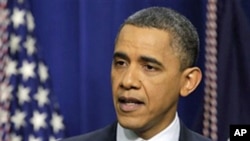President Barack Obama has praised Egypt’s new ruling military council, and the Pentagon says the Egyptian military continues to play a positive role in the country’s transition.
At a White House news conference, President Obama offered a concise assessment of the military council that took power in Cairo on Friday.
“There is still a lot of work to be done in Egypt itself, but what we have seen so far is positive,” said Mr. Obama.
The president said the council has reaffirmed Egypt’s commitments to Israel and the international community, and that opposition leaders believe the council is serious about democratic reforms. But Mr. Obama said the country will need help in building democratic institutions, after decades of severe limitations, and also in rebuilding its economy, which is based largely on tourism devastated by the three weeks of street protests.
President Obama also defended his handling of the Egypt crisis, saying he knew the United States could not determine the outcome but that he was “on the right side of history” in supporting the demonstrators’ calls for more freedom and democracy - aspirations he said he supports throughout the region and the world.
“We sent out a very clear message that we believed in an orderly transition, a meaningful transition, and a transition that needed to happen not later, but sooner. And we were consistent on that message throughout,” he added.
The president came under some criticism for not supporting now-former-President Hosni Mubarak, a longtime U.S. ally. Mr. Obama acknowledged he is concerned about stability in Egypt, and elsewhere in the region where protesters are demonstrating. But he said he believes that in the long term, reforms and what he called “messy” democracy will lead to less radicalism and better outcomes on Middle East peace talks and other issues.
He says so far his view has been borne out in Egypt.
“Part of the test is that what we ended up seeing was a peaceful transition, relatively little violence and relatively little, if any, anti-American sentiment,” said Mr. Obama.
The president also noted there was little anti-Israel or general anti-Western sentiment in the protests.
At the Pentagon, spokesman Colonel David Lapan said U.S. Defense Secretary Robert Gates still believes the Egyptian military is playing a constructive role, even though its takeover happened outside the country’s constitutional process.
“It is the fact that this has been done with relatively little violence, that the military continues to play a stabilizing influence on the situation there,” Lapan said. “So, it is in that context.”
Lapan said Gates spoke to the Egyptian military council chairman, Field Marshal Mohammed Tantawi, on Saturday, the day after he took power. It was their sixth reported conversation since the crisis began, but the Pentagon has not provided any details. Secretary Gates has not commented on Egypt since before the power change, although he was asked about it three times during a news conference Monday.

